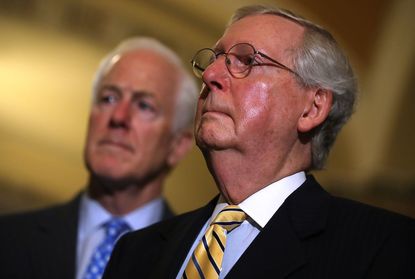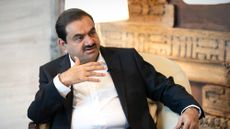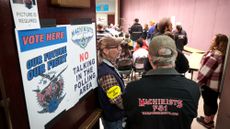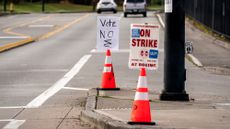In the second day of health-care voting, the Senate will tackle repeal-only bill


On Tuesday, the Senate very narrowly voted to open debate on a bill to at least repeal much of the Affordable Care Act, and Tuesday night, nine Republicans and 48 Democrats and independents shot down Senate Majority Leader Mitch McConnell's plan to repeal and replace ObamaCare. (McConnell's modified Better Care Reconciliation Act "is not necessarily dead," Axios notes. "Another, simpler version — like the most recent one scored by the Congressional Budget Office — could still come up later in the process.")
Late Wednesday morning or early afternoon, the Senate is expected to vote on a measure to repeal ObamaCare without a replacement plan, similar to a bill Republicans passed in 2015, thwarted by former President Barack Obama's veto. It is widely expected to fail, too. If so, the last plausible option for Senate Republicans is to pass what's being called "skinny repeal," scrapping ObamaCare's personal and employee mandates and a medical device tax, but leaving Medicaid, ObamaCare subsidies, benefit regulations, and everything else in place. "Basically no senators will like it," Politico explains, "but they may vote for it just to keep the repeal drive going."
Assuming the House wouldn't hold an up-or-down vote on the "skinny repeal" bill, it would go to a House-Senate conference committee, where Republicans would try to come up with a bill that could pass in both chambers. "The endgame is to be able to move something at the end of this process across the Senate floor that can get 50 votes and then to get into conference with the House," said Sen. John Thune (R-S.D.).
Subscribe to The Week
Escape your echo chamber. Get the facts behind the news, plus analysis from multiple perspectives.

Sign up for The Week's Free Newsletters
From our morning news briefing to a weekly Good News Newsletter, get the best of The Week delivered directly to your inbox.
From our morning news briefing to a weekly Good News Newsletter, get the best of The Week delivered directly to your inbox.
Before a final vote, the Senate will consider dozens of amendments, in what's being called "vote-a-rama" sessions, likely starting Thursday night. The Senate parliamentarian will also likely be asked to approve or throw out measures that don't meet the restrictions of the budget reconciliation process Republicans are using. Nobody knows where this unusual legislative effort to modify a huge chunk of the economy and a health-care system used by tens of millions of Americans will end, but it is expected to conclude early Friday. "All we have to do today is to have the courage to begin the debate with an open amendment process," McConnell told his caucus on Tuesday. "And let the voting take us where it will."
Sign up for Today's Best Articles in your inbox
A free daily email with the biggest news stories of the day – and the best features from TheWeek.com
Peter has worked as a news and culture writer and editor at The Week since the site's launch in 2008. He covers politics, world affairs, religion and cultural currents. His journalism career began as a copy editor at a financial newswire and has included editorial positions at The New York Times Magazine, Facts on File, and Oregon State University.
-
 Why are home insurance prices going up?
Why are home insurance prices going up?Today's Big Question Climate-driven weather events are raising insurers' costs
By Joel Mathis, The Week US Published
-
 'All too often, we get caught up in tunnel vision'
'All too often, we get caught up in tunnel vision'Instant Opinion Opinion, comment and editorials of the day
By Justin Klawans, The Week US Published
-
 2024: the year of legacy media failures
2024: the year of legacy media failuresIn the Spotlight From election criticism to continued layoffs, the media has had it rough in 2024
By Justin Klawans, The Week US Published
-
 Judges block $25B Kroger-Albertsons merger
Judges block $25B Kroger-Albertsons mergerSpeed Read The proposed merger between the supermarket giants was stalled when judges overseeing two separate cases blocked the deal
By Peter Weber, The Week US Published
-
 Rupert Murdoch loses 'Succession' court battle
Rupert Murdoch loses 'Succession' court battleSpeed Read Murdoch wanted to give full control of his empire to son Lachlan, ensuring Fox News' right-wing editorial slant
By Peter Weber, The Week US Published
-
 Bitcoin surges above $100k in post-election rally
Bitcoin surges above $100k in post-election rallySpeed Read Investors are betting that the incoming Trump administration will embrace crypto
By Peter Weber, The Week US Published
-
 Enron mystery: 'sick joke' or serious revival?
Enron mystery: 'sick joke' or serious revival?Speed Read 23 years after its bankruptcy filing, the Texas energy firm has announced its resurrection
By Peter Weber, The Week US Published
-
 US charges Indian tycoon with bribery, fraud
US charges Indian tycoon with bribery, fraudSpeed Read Indian billionaire Gautam Adani has been indicted by US prosecutors for his role in a $265 million scheme to secure solar energy deals
By Peter Weber, The Week US Published
-
 Boeing machinists approve contract, end strike
Boeing machinists approve contract, end strikeSpeed Read The company's largest union approved the new contract offer, ending a seven-week strike
By Peter Weber, The Week US Published
-
 US economy still strong in final preelection report
US economy still strong in final preelection reportSpeed Read It grew at a solid 2.8% annual rate from July through September
By Peter Weber, The Week US Published
-
 Boeing machinists reject deal, continue strike
Boeing machinists reject deal, continue strikeSpeed Read The rejection came the same day Boeing reported a $6.2 billion quarterly loss
By Peter Weber, The Week US Published